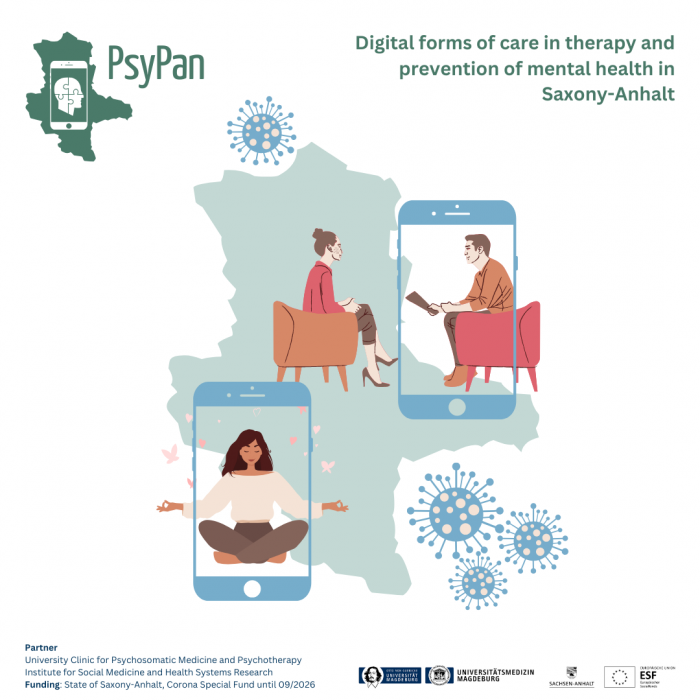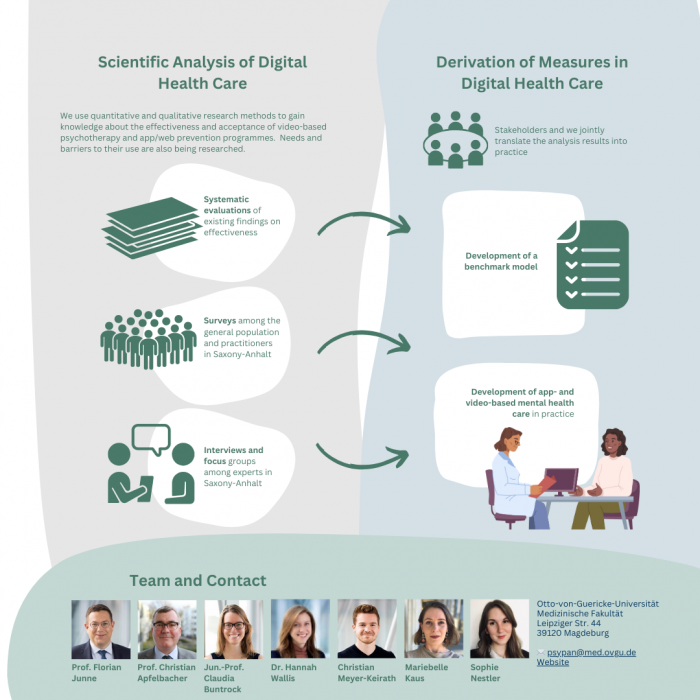PsyPan - Strengthening pandemic resilience in the field of mental health through tele-psychotherapy and digital prevention programmes in Saxony-Anhalt
Welcome to PsyPan.
We, the PsyPan team, are researching digital psychological prevention programmes and video-based psychotherapy. Together with stakeholders, we are developing a model for prevention and psychotherapy care in Saxony-Anhalt that translates our research into practice.
Background
Mental health concerns us all: One in eight people worldwide lives with a mental illness (Institute for Health Metrics and Evaluation, 2023). The coronavirus pandemic has also shown how important crisis-proof mental health care is. During the pandemic, mental stress levels in the population increased, while at the same time many prevention and therapy services had to be paused (Dragano et al., 2022; Schempp & Kaun, 2022; Heidemann et al., 2022).
Psychological interventions are increasingly being offered digitally (Andersson et al., 2019). Preventive apps and web courses - for meditation or stress management, for example - can reach many people at the same time and be used independently. Video psychotherapy makes traditional therapeutic treatment available from any location, which is particularly beneficial for people in rural areas. Both approaches can also be maintained in times of crisis, as they work even under contact restrictions (Rauschenberg et al., 2021).
Despite these advantages, digital services are not yet well established in existing care provision. There is a lack of models that systematically take into account the acceptance, barriers and needs of all those involved.
Our research activities
Our current research activities include
- A large-scale population survey with 4,000 randomly selected people in Syxony-Anhalt
- Stakeholder workshops with users, patients, doctors, psychotherapists, representatives of health insurance companies, politicians, scientists, providers and other health care organisers
- Focus groups and interviews with various interest groups
- Systematic meta-studies on the effectiveness of digital prevention and therapy
- Comprehensive surveys in GP and psychotherapeutic practices

Involved Parties
|
University Clinic for Psychosomatic Medicine and Psychotherapy (KPSM) |
||
| Institut of Social Medicine and Health Systems Research (ISMG) | ||
|
|
Funded by the state of Saxony-Anhalt, 10/2022-09/2026 |
References
Andersson, G., Carlbring, P., Titov, N., & Lindefors, N. (2019). Internet Interventions for Adults with Anxiety and Mood Disorders: A Narrative Umbrella Review of Recent Meta-Analyses. The Canadian Journal of Psychiatry, 64(7), 465–470. https://doi.org/10.1177/0706743719839381
Dragano, N., Reuter, M., Peters, A., Schmidt, B., Bohn, B., & Berger, K. (2022). Increase in Mental Disorders During the COVID-19 Pandemic—Role of Occupational & Financial Strains. European Journal of Public Health, 32(Supplement_3), ckac129.028. https://doi.org/10.1093/eurpub/ckac129.028
Heidemann, C., Reitzle, L., Schmidt, C., Fuchs, J., Prütz, F., & Scheidt-Nave, C. (2022). Nichtinanspruchnahme gesundheitlicher Versorgungsleistungen während der COVID-19-Pamdemie: Ergebnisse der CoMoLo-Studie. https://doi.org/10.25646/9563
Rauschenberg, C., Schick, A., Hirjak, D., Seidler, A., Paetzold, I., Apfelbacher, C., Riedel-Heller, S. G., & Reininghaus, U. (2021). Evidence Synthesis of Digital Interventions to Mitigate the Negative Impact of the COVID-19 Pandemic on Public Mental Health: Rapid Meta-review. Journal of Medical Internet Research, 23(3), e23365. https://doi.org/10.2196/23365
Schempp, N., & Kaun, L. (2022). Präventionsbericht 2022. Leistungen der gesetzlichen Krankenversicherung: Primärprävention und Gesundheitsförderung. Leistungen der sozialen Pflegeversicherung: Prävention in stationären Pflegeeinrichtungen. Berichtsjahr 2021. Medizinischer Dienst Bund.






